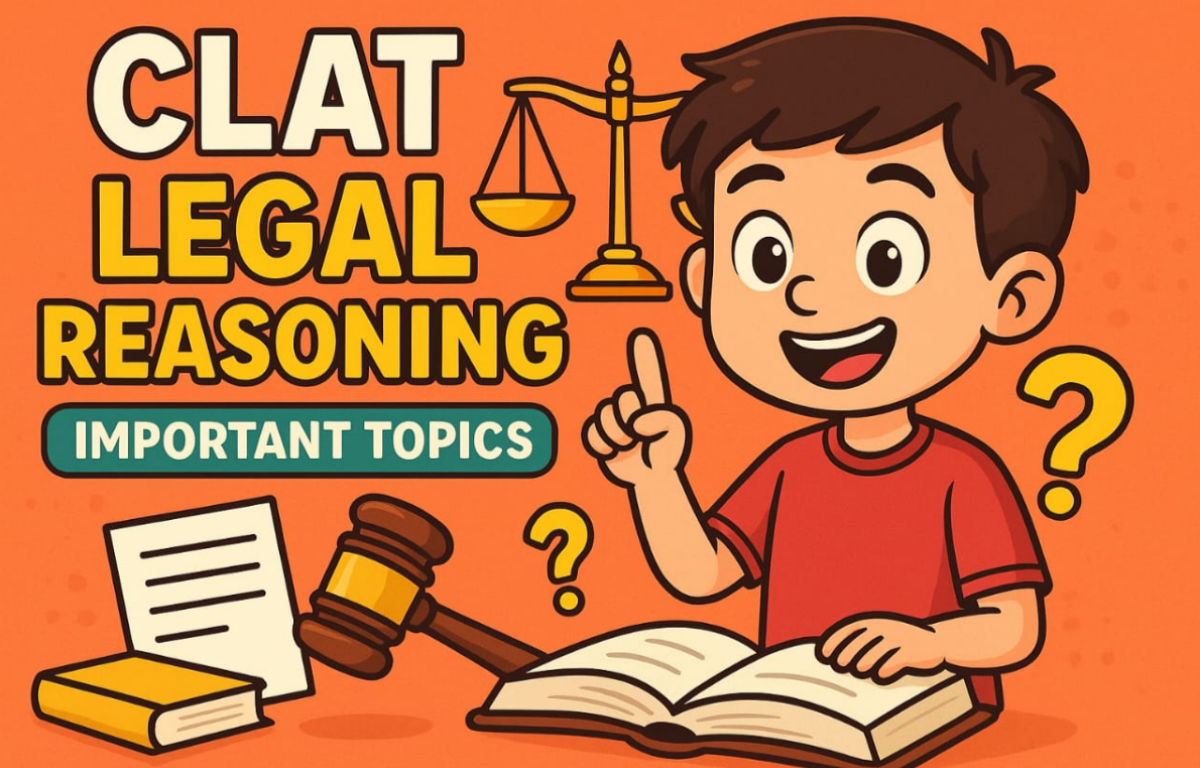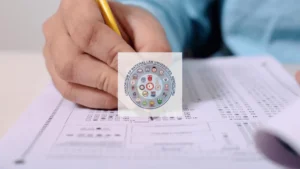CLAT Legal Reasoning Important Topics: Cracking CLAT becomes a lot easier when you know exactly what to concentrate on! Legal Reasoning is one of the most scoring yet tricky sections in CLAT, and with smart preparation, you can get a good head start toward the thousands of other aspirants. In this article, we will outline the most important Legal Reasoning topics for CLAT 2026, which every student must back up their knowledge.
Topics like the Constitution of India, Law of Torts, and Leading Case Laws & Supreme Court Judgements define the legal reasoning section of the exam. If you can understand this, not only will your confidence and familiarity with the latest CLAT Exam Pattern improve, but also your speed and accuracy at answering case-based questions. Let’s take a look at the important topics that could make or break a student’s CLAT score.
CLAT Legal Reasoning Exam 2026
For law aspirants, the CLAT Legal Reasoning exam is an indispensable piece of the examination puzzle, which means the clock is ticking with CLAT 2026 just around the corner. As per the released notification, the CLAT 2026 is scheduled to be conducted on December 07, 2025, and will be held in pen-and-paper (offline) mode, with case studies or passages followed by questions to assess critical thinking, Legal connections, and analytical ability.
The purpose of CLAT and Legal reasoning is to assess how well students can understand arguments, make connections, identify patterns, and draw correct conclusions – skills that would help them in their future lawyer career. CLAT is conducted for higher education in various National Law Universities (NLUS) for students who have completed or are about to complete Class 12. Scoring high in Legal Reasoning can benefit you significantly in securing a top rank.
CLAT 2026 Legal Reasoning Syllabus
The CLAT Legal Reasoning syllabus is structured to assess a student’s ability to comprehend legal concepts and apply them to practical settings. Some areas of discussion are: constitutional law, contracts, criminal law, torts, family law, and current legal issues. It is best practice to improve reading comprehension, logical application of the rules, and analytical response to legal context through case-based reading passages.
In preparation, students can also engage in old CLAT past year questions (PYQ), practice mock tests, and stay aware of recent judgments and new areas in law. Reading newspapers and legal articles to enrich and maintain analytical thinking is also highly encouraged. Overall, students will be rewarded in this segment as it is based on clarity in way of thinking, accuracy, and well-structured reasoning skills.
| CLAT 2026 Legal Reasoning Syllabus | |
| Topics | Details |
| Constitution of India |
|
| Leading Case Laws & Supreme Court Judgements |
|
| Law of Torts |
|
| Contract/Civil Law |
|
| Important Legal Terms |
|
| Legal Maxims |
|
| Criminal Law |
|
| Legal GK |
|
| Important Treaties & Conventions |
|
| International Laws & IPR |
|
| Famous Indian Cases & Lawyers |
|
| Famous Doctrines |
|
CLAT 2026 Legal Reasoning Important Topics
CLAT Legal Reasoning covers several important topics that students must focus on for scoring well. Students need to focus on topics such as Constitutional Law, Law of Torts, Criminal Law, Contract Law, Family Law, and International Law. Along with this, questions are also framed on Legal Maxims, Fundamental Rights, Duties, and current legal developments. Practicing passages framed on these topics helps students learn how to apply rules and principles to facts. A good hold of these areas can dramatically improve your accuracy and confidence in the exam, along with mock tests and PYQs.
| CLAT 2026 Legal Reasoning Important Topics |
| Law of Torts |
| Law of Contracts |
| Criminal Law |
| Constitutional Law |
| International Law |
| Intellectual Property Law |
| Family Law |
| General Legal Principles |
Most Important Topics for CLAT Legal Reasoning
Legal Maxims
Legal maxims are short, well-known principles that guide the working of the law. They have developed over time through court decisions and precedents. Learning these maxims makes it easier to understand the core ideas of law and how they are applied in real-life situations. They act like guiding rules that simplify complex legal concepts, helping students and professionals build a stronger foundation in legal studies and practical applications.
Constitutional Law
This topic focuses on the key principles and rules of the Indian Constitution, such as fundamental rights, directive principles, and the separation of powers. To study law effectively, it is important to have a clear understanding of the Constitution and its provisions. Knowing these basics helps in understanding how the country functions and how the rights and duties of citizens are protected.
Criminal Law
This topic covers the main ideas and rules of the Indian Penal Code, along with other criminal laws. It helps you learn about different types of crimes, the punishments they carry, and the legal steps followed in criminal cases. Understanding these basics is important for knowing how criminal justice works and how laws maintain order in society.
Contract Law
The Contract Law topic in Legal Reasoning focuses on the principles and rules of contract law, which form the base of many legal and business dealings. It includes understanding the different types of contracts, how they are created, and when they can be enforced by law. You also need to learn the legal terms commonly used in contracts and how they are interpreted to resolve disputes fairly and clearly.
Tort Law
Tort law focuses on civil wrongs where one party’s actions cause harm to another. It includes important areas such as negligence, nuisance, and defamation. Learning tort law helps in understanding the rights of individuals and the duties owed by others in society. Students should also know the various types of torts and their consequences, as these form the basis of legal responsibility and remedies.
International Law
International law focuses on rules and agreements that guide relations between countries. It covers areas like global treaties, human rights, and the role of international organizations. Understanding these principles helps in promoting peace, cooperation, and justice worldwide, while also ensuring nations respect each other’s rights and work together to solve global issues.
Why is it Important for Students to have a Proper Understanding of the CLAT Legal Reasoning Important Topics?
Having a proper understanding of the Legal Reasoning important topics is very necessary for each student, so they don’t get confused about which topic to study and which to skip.
- Legal reasoning is one of the most important sections of CLAT.
- Understanding important topics makes concepts clear.
- It helps in solving passage-based questions quickly.
- Reduces confusion and improves accuracy.
- Saves time in the exam to attempt more questions.
- Builds strong logical and analytical thinking.
- Increases the chances of getting a good rank.









 CLAT Colleges 2026 List: Check Top Unive...
CLAT Colleges 2026 List: Check Top Unive...
 CLAT Sample Papers 2026 Released by Cons...
CLAT Sample Papers 2026 Released by Cons...
 Download CLAT Previous Year Question Pap...
Download CLAT Previous Year Question Pap...







